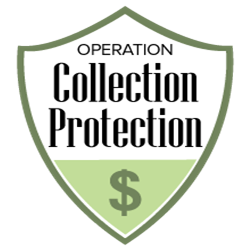New York - If there were a Debt Collection Decathlon – and we’re glad there isn’t – National Check Registry would have been a contender. According to the FTC and New York AG, the Buffalo-based debt collector “excelled” in a number of events: the Bogus Lawsuit Vault, the Disclosure of Debt Dash, and the Unauthorized Fee High Jump, to name just a few. Announced as part of Operation Collection Protection, the settlement with nine related companies and three individuals has taken them out of medal contention once and for all and earned them induction into the Debt Collection Hall of Shame.
The FTC-AG complaint alleges that the defendants waged a campaign of lies, threats, and harassment, in violation of the FTC Act, the Fair Debt Collection Practices Act, and New York law. Among the defendants’ specialties were false claims that if consumers didn’t pay up over the phone right then and there, they faced imminent lawsuit, wage garnishment, arrest, or imprisonment. Adding insult to injury, when consumers knuckled under and made immediate payments, the defendants tacked on an illegal “processing fee.”
 The FTC has brought a slew of cases against collectors who violated the FDCPA by revealing the existence of a purported debt to people’s friends, family, and co-workers. But the FTC says the defendants went a step further by telling loved ones and colleagues that the consumer had committed check fraud and would be arrested if the debt wasn’t paid pronto.
The FTC has brought a slew of cases against collectors who violated the FDCPA by revealing the existence of a purported debt to people’s friends, family, and co-workers. But the FTC says the defendants went a step further by telling loved ones and colleagues that the consumer had committed check fraud and would be arrested if the debt wasn’t paid pronto.
How could consumers tell if the defendants were collecting on a debt they actually owed? According to the FTC and AG, in many cases they couldn’t because the defendants failed to provide them with required notices and disclosures. When people offered proof they didn’t owe the supposed debt, the defendants ignored the evidence and accused them of fraud.
With tactics like that, it’s not surprising that National Check Registry found itself in hot water, including a 2013 go-round with the New York AG. But rather than clean up their act, the defendants’ modus operandi was to set up shop under a different name.
The settlement imposes a $8.3 million judgment, which represents just about all the money they made. Under the terms of the order, after they turn over cars, boats, bank accounts, and $112,000 in cash, the rest of the judgment will be suspended due to their inability to pay.
The defendants are also banned for life from debt collection, joining more than 80 others who have been booted out of the business for good.
What can other debt collectors learn from the latest case?
- It’s illegal to threaten people with arrest or imprisonment or falsely accuse them of committing a crime. The law also cries foul when debt collectors lob bogus threats of lawsuit, wage garnishment, or property seizure.
- When it comes to debt collection, mum’s the word. It’s illegal to disclose to family, friends, employers, or co-workers that someone owes money.
- Section 809 of the FDCPA lays out step-by-step procedures debt collectors must follow to validate debts they’re trying to collect. This isn’t just routine paperwork. It’s an essential safeguard to make sure collectors are contacting the right people about money they really owe.
- As Operation Collection Protection proves, the FTC and law enforcement partners are united in their fight against illegal debt collection. Exhibit A: the FTC’s close working relationship with the New York AG in bringing law violators to justice.
